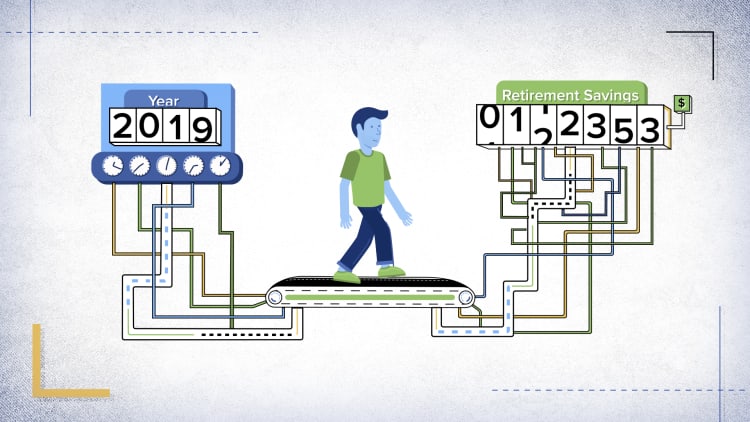
Tricking yourself may be an effective strategy for getting better at managing money.
Some people swear by spreadsheets, others by budgets.
But what about people who freeze up at the very idea of using a calculator?
It's easy. Or not as hard as you'd think.
Make a few behavioral changes. It's mind over money, and you can do it even without a degree in higher math or a deep love of operating systems and software.
Look more, spend less
You may not need a strict budget. With nothing more than budgeting tools on a personal finance app, try eyeballing your spending. Check every day or two, so you can see if you reach your spending limit for the month.
The very act of simply checking and being mindful can be enough to push you into spending less.
The goal is to make saving your default action. You can change your mindset so that most nonessentials start to feel like you're spending on luxuries. Don't let yourself spend automatically — do it with full consciousness.
Those two states of being, consciousness and unconsciousness, can be used in tandem to manage your money better. It's better to be more conscious about spending. It's better to be less conscious about saving. In other words, find a way to do it automatically.
Put it on autopilot
"Automate as much of your investing as possible," said Chris Kampitsis, a certified financial planner at the Barnum Financial Group in Elmsford, New York.
People tend to set it and forget it once they've made their investment selections, Kampitsis says. And that's a good thing. "Every pay period a certain amount goes in, and also is [often] being matched by their employer." Investing in a 401(k) gives people the benefit of dollar-cost averaging as the market moves up and down.
Kampitsis recommends making this work for a savings account: The more you automate, the less conscious you'll be about down markets. In other words, remove thinking from the equation. "It takes out the guesswork," he said. "You don't have to agonize over decisions."
"It can be as simple as setting up an automated contribution to a savings account at a different bank where those funds grow slowly but surely and stay out of site and out of mind," said Priya Malani, a founding partner at financial planning firm Stash Wealth in New York.
Got paper?
Mindfulness is a game changer, says Stacy Trinh, 34, who lives in Honolulu and owns the personal finance blog Keeping Up with the Changs.
"Simply writing out your expenses in a monthly calendar as you go is a very eye-opening exercise, even if you aren't formally following any rules or budgets," Trinh said.
Divide and conquer
Moriah Joy Sollie, 21, and her husband keep a separate bills account.
"We add up all our bills and divide by four — the number of paychecks we get in a month," said Sollie, an editorial assistant in Sacramento, California.
If your monthly bills are $2,000 and you get four paychecks, $500 from each check is automatically deposited to a separate bill-paying account.
"It keeps us from ever spending bill money, and all of our bills are paid on time," Sollie said. "And I don't worry that we're not going to have enough money."
Try a savings challenge
More disciplined grocery shopping turned into a creative challenge for Rachel Newcomb, 44, an anthropology professor in Orlando, Florida.
"I used to change my mind in the middle of the day about what I wanted to eat for dinner, and then I would shop for a whole new meal," Newcomb said, "even if I already had ingredients at home that I could have made into something."
Newcomb now shops once a week and plans meals in advance.
Her advice: Don't buy extras that aren't on your list. Try to make it through the week without shopping again or treating yourself to nights out.
"All those costs add up, especially when you love to cook, Newcomb says. Experimenting taught her that some recipes turned out perfectly fine even without imported Spanish capers or a quarter-teaspoon of an ingredient that would have cost $5 for a one-time use.
Pay yourself first
Malani recommends something she calls the "reverse budget." "It's based on the premise of saving first so you can blow the rest," she said.
You start by moving money into a savings account automatically so you don't even realize it. "What's left in your checking account is yours to blow, guilt-free," Malani said.

More from Invest in You:
Zen millionaire Ken Honda's three money personalities
It's not your imagination. Spending is easier than saving
You'll probably regret that timeshare and car payments
CHECK OUT: 3 mental shifts that can help you save money for a home via Grow with Acorns+CNBC.
Disclosure: NBCUniversal and Comcast Ventures are investors in Acorns.





